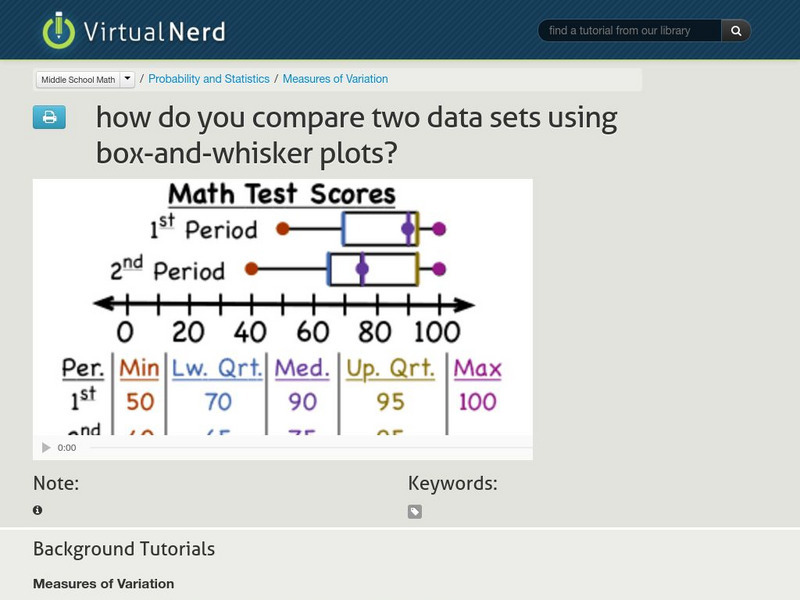Hi, what do you want to do?
Flipped Math
Describing Data
No need to nap through the lesson. Given data on the number of naps two teachers take, learners calculate the mean, median, mode, and range, and then interpret their results in terms of the context. They then see how to determine the...
Curated OER
What is a Frequency Table?
So you have a data set and you want a visual diagram to help you analyze the data. Not sure how to draw it? The instructor illustrates four different ways to look at a frequency table: two tally tables, one line graph, and one bar graph....
Northeast Arkansas Education Cooperative
Construct and Interpret a Cumulative Frequency Histogram
The finer points of telling the difference between cumulative and frequency histograms are laid out with clear examples for how to get from one to the other. From defining vocabulary through converting charted data to histogram form,...
Crash Course
Data and Infographics: Crash Course Navigating Digital Information #8
One-hundred percent of those reading this sentence are human beings. Wait, what? With part eight in the Crash Course: Navigating Digital Information set, pupils learn how to think critically about statistics. Scholars discover how...
Curated OER
What is a Frequency Table?
So you have a data set and you want a visual diagram to help you analyze the data. Not sure how to draw it? The instructor illustrates four different ways to look at a frequency table: two tally tables, one line graph, and one bar graph....
Bozeman Science
Graphing Data by Spreadsheet
Watch your pupils Excel at using spreadsheets to graph data by watching a video that covers how to graph data in a scatter plot using Microsoft Excel. The video also covers how to change titles, scales, and labels, as well as how to...
Curated OER
How Do You Use a Scatter Plot to Find a Line of Fit?
What is a line-of-fit? Given a data set, plot the ordered pairs on a graph. It looks like a scatter plot. Now estimate, and draw a line that best fits what the data represents. That is your line-of-fit.
Curated OER
How Do You Use a Scatter Plot to Find a Line of Fit?
What is a line-of-fit? Given a data set, plot the ordered pairs on a graph. It looks like a scatter plot. Now estimate, and draw a line that best fits what the data represents. That is your line-of-fit.
Corbett Maths
Reading Bar Charts
Not just a bar graph—it's a double bar graph! Young scholars learn to read a double bar graph as they view the instructional video. The video highlights the individual data as well as shows a comparison between the two sets of data...
Khan Academy
Recognizing Linear Functions, Linear Equations and Functions
Starting with a set of values for the x and y variables, this video shows how to tell whether these points determine a linear or non-linear function. Sal first defines linear functions in terms of the change in y over the change in x,...
Curated OER
How Do You Make a Scatter Plot?
So you've got some x-values and some y-values and you want to make a scatter plot. First thing is to make a table for your x and y values. Then make ordered pairs and you can plot them.
Curated OER
How Do You Make a Scatter Plot?
So you've got some x-values and some y-values and you want to make a scatter plot. First thing is to make a table for your x and y values. Then make ordered pairs and you can plot them.
National Education Association
Scatter Plots
What's my line, anyway? A video covers the aspects of finding an equation of the best-fit line for a set of data. It works through plotting the points to drawing a line that appears to represent the data. The presenter suggests finding...
Corbett Maths
Frequency Polygons
How many ways can you think of to display data? A quick video lesson describes the process of creating one of them, a line graph, which is also referred to as a frequency polygon. After creating the graph, the instructor models how to...
National Education Association
Determining Domain and Range
Introduce the concept of domain and range with a video that starts with the formal definitions of the domain and range and moves on to the practical descriptions used to determine them. The presentation explains how to find the domain...
Curated OER
What Does it Mean To Have No Correlation?
What does it mean when a scatter plot graph shows that there is no correlation? Does it have something to do with the slope of the line of fit? Yes, it certainly does have to do with the line of fit. If the slope of the line is zero,...
Curated OER
How Do You Use a Scatter Plot to Find No Correlation?
How do you determine the correlation in a set of data? Plot the data, find the line of fit, then use that line to determine if the correlation is positive, negative, or no correlation. This tutorial demonstrates that when a line of fit...
Corbett Maths
Drawing a Pie Chart
Easy as pie ... with a little work anyway! A complete lesson provides video instruction on creating a pie chart from a set of data. The practice that follows helps learners draw their own pie charts while practicing skills from the...
National Education Association
Slope and Direct Variation
We all know linear equations are special, but the direct variation equation is extra special! The video begins with a set of data to illustrate a direct variation relationship. It then completes examples of writing direct variation...
Crash Course
Intro to Algorithms: Crash Course Computer Science #13
Chances are you benefit from computer algorithms every day. Viewers learn about algorithms and how they can be useful in sorting. They watch as the narrator sets up and uses a selection sort, a merge sort, and a graph search algorithm in...
Howard Hughes Medical Institute
Measuring Circadian Activity in Drosophila
How many hours should be in a day? One species of drosophila naturally prefers a 24.5 hour day, while another strongly prefers a 19-hour day. An animation and graph share data from each of these species when exposed to the typical light...
Bozeman Science
Standard Error
Standard error means ... it's okay to be wrong? Viewers learn how to calculate standard error from the standard deviation and the number of data values, both by hand and by using spreadsheets. The video also shows how to display this...
Virtual Nerd
Virtual Nerd: How Do You Compare Two Data Sets Using Box and Whisker Plots?
How do you describe the similarities and differences between two data sets using box-and-whisker plots? This video gives you a great explanation using an example of test scores from two different math classes. [5:27]
Khan Academy
Khan Academy: Making Picture Graphs and Line Plots
Watch this video demonstration of how to make picture graphs and line plots. Includes a video, transcript, and question and answer section. [3:08]




























